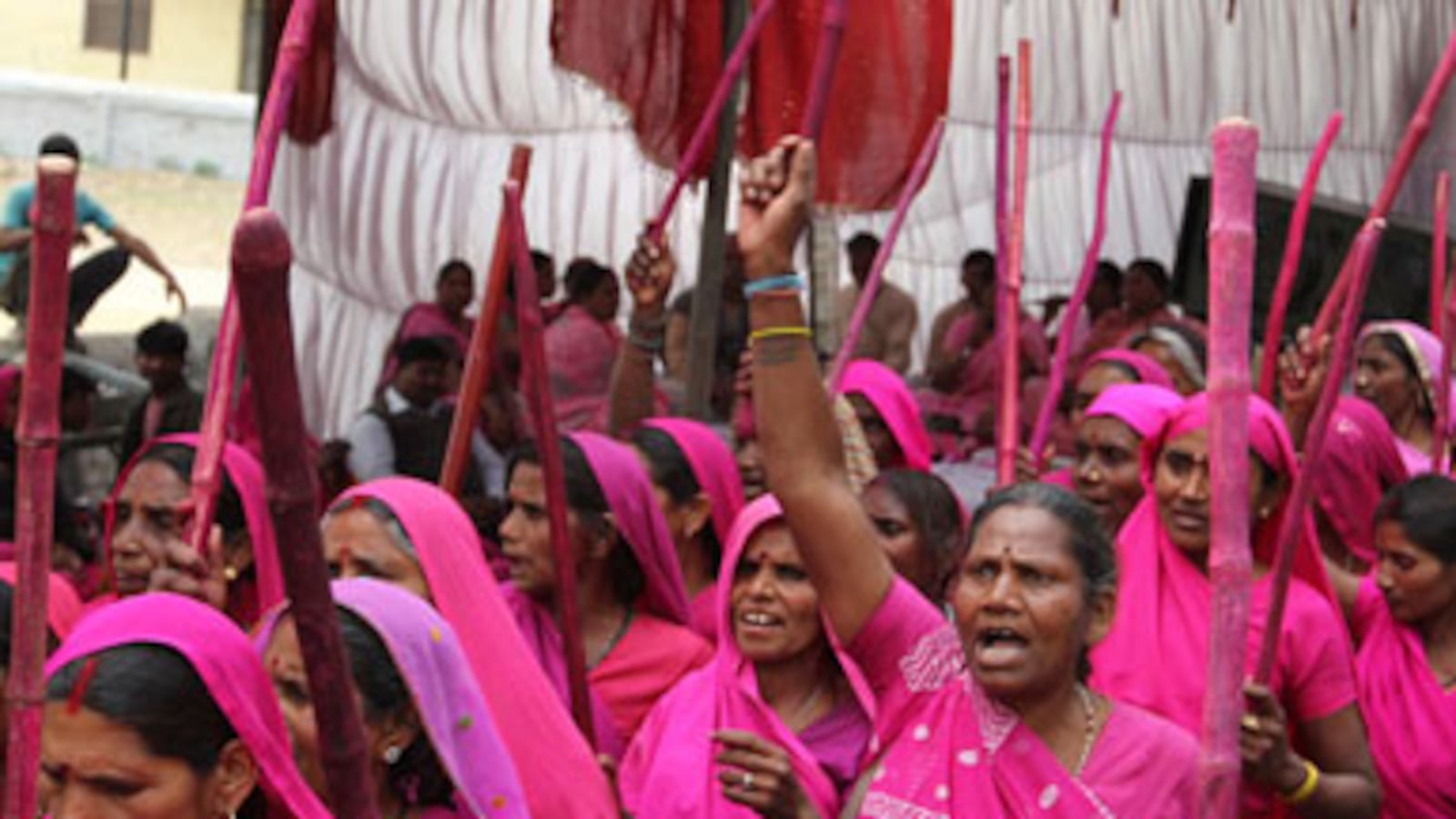The unofficial headquarters of India's Pink Gang, the largest women's vigilante group in the world, is a small pink house in the dusty agricultural town of Badausa, about 250 miles south of the majestic Taj Mahal. This concrete, box-shaped structure belongs to Sampat Devi Pal, the self-proclaimed commander in chief of the gulabi gang, which means pink gang in Hindi, after the group's electric pink sari uniform.
Every day, nearly half a dozen forlorn women arrive here to ask Pal for support. Most of them have come through word of mouth, or after reading about the gang's headline-grabbing victories in the paper. To get here, some have had to undertake long journeys on rickety buses or hitchhike on roads made unsafe at night by bandits. They come with harrowing tales of abuse that neither the police, nor their local communities, have done anything to address.
Gallery: India's Pink Gang

On a recent sunny afternoon, as colorfully painted freight trucks rumbled past on the main road, Pal, a sturdy woman with a fiery temper, offers steaming chai and samosas to the women who have shown up at her home. One of them, a petite woman called Soman, has arrived with her husband and son in tow. Her husband was just released after three years in captivity, kidnapped by a local gang over a property dispute. While he was away, Soman relied exclusively on Pal for help finding him; she claims the police were paid not to interfere in the investigation. Pal collected donations of grains and pulses for Soman from other gang members, and organized protest marches to demand the police help track down her husband. "What Sampat-ji has done for me, I will never forget in my whole life," Soman says. She has traveled an hour by train to reach Pal's home. "Without her, our enemies surely would have killed us."
Operating in the badlands of Uttar Pradesh, India's most populous and poverty-stricken state, Pal's group gained notoriety in early days for beating up men who abused their wives. If they heard a husband was being violent, they would show up at his door with sticks called laathis—the same wielded by local cops when patrolling their beat—and demand he change his ways. Of the many cases that Pal handles every day, the majority are related to domestic violence, dowry demands, and abusive in-laws—though recently she helped the father of a 17-year-old girl who'd been raped and jailed on a false charge.
"There are so many struggles that women here have to go through, it never seems to stop," Pal says, wiping her forehead with the edge of her sari. "We don't like using violence, but sometimes that's the only way people listen."
Pal has reason to be weary: The 48-year-old was married off at 12, and had her first child at 15. She works seven days a week, from the crack of dawn until nightfall, counseling women, organizing sit-ins, and leading rallies. For years, Pal worked as a volunteer with local women's NGOs, but started the Pink Gang in 2006 because she was frustrated by their lack of progress. With few resources at her disposal, and little to no funding (Pal charges about $4 for membership to the group, in exchange for the pink sari that members wear proudly), the woman relies on her rusty bicycle and old Nokia cellphone to get around and solve problems.
At first it was just five women, all old friends. But in a span of five years, the group has grown into a powerful brigade of more than 20,000 women, including 10 district commanders, who run the gang's outposts across the district of Bundelkhand—an area that spans 36,000 square miles. These local Pink Gang stations operate in the same way as Pal's own home does: They are meeting places for women to discuss their problems and, like Pal's own home, the doors are always open.
For many women in India, the Pink Gang is their last hope for justice. But as the group has grown in size and power, so too have their opponents. Today Pal doesn't just take on abusive husbands, she challenges corrupt policemen and dishonest politicians—often putting her group in the center of controversy. Early this year, Pal worked to help a 17-year-old girl, Sheelu Nishad, who'd been gang-raped by a group of men, including one she identified as a member of the local legislature, Purushottam Dwivedi. Nishad went to the police, but instead of being questioned, she was arrested—it turned out her attacker had already called the police, accusing her of theft. Her father went to Pal for help. "I was nervous and crying and somebody suggested I go to the gang," says the frail elderly man. Pal organized an agitation in front of the police station, and later in front of Dwivedi's house. So effective was her intervention that Dwivedi was arrested, and Rahul Gandhi, the heir to the Gandhi family's political throne, traveled the 370 miles from New Delhi to meet the girl. "She is a very good lady," Nishad says of Pal. "She has told the world about my plight."
“People have tried to assassinate me, arrest me, abuse me and shut me up, but I won’t be quiet until things improve for the women here.”
Until recently, the Pink Gang had acted primarily outside of the political system—as vigilantes and activists, to the ire of local politicians. They've been called "militant Maoists" by local police (an accusation that was later retracted) and charged with things like assault and defamation. But they've also gained political clout: In October, a record 21 Pink Gang members won panchayat elections—the equivalent of American municipality elections. In these positions, the elected Pink Gang officials oversee construction and repair work of the local roads, provide for sanitation and drinking water and implement development schemes for agriculture. "Before, the village chiefs never used to listen to our issues, but with the Pink Gang in power, life will become easier," says Usha Patel, a wiry woman who spent many days rallying support for her district commander. "Finally, the poor are getting their rights."
Pal hopes this represents the beginning of the Pink Gang's political future—and a way for their power to rise beyond the streets. "It's important for vigilante groups, especially [those] run by women, to seek some form of social or legal sanction for their existence," says Atreyee Sen, a fellow at the University of Manchester and the author of Global Vigilantes. "Taking part in formal politics [can] legitimize [their] role." Pal, for her part, has no plans of backing down. "People have tried to assassinate me, arrest me, abuse me and shut me up," she says. "But I won't be quiet until things improve for the women here."
The 2011 Women in the World Poll
Amana Fontanella-Khan is a feature writer in Mumbai who is working on a book about the Pink Gang. Her work has appeared in The New York Times, The Financial Times, Slate Magazine, Vogue and Conde Nast Traveler. Follow her on Twitter






